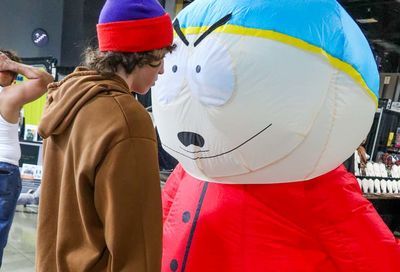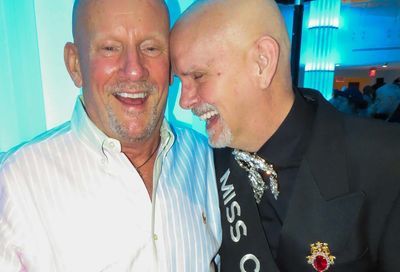A Helping Hand
Brother, Help Thyself presents its annual grants
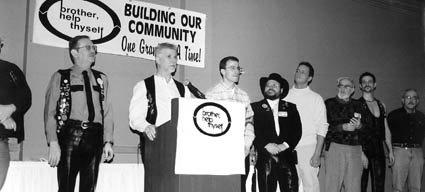 |
The young woman with the neon-strawberry-colored hair drops a small business card in front of Larry Stansbury and rushes off. On the back of the card, neatly written in purple-ink is the following message:
“Thank you so much! We truly appreciate BHT’s support and kindness — HIPS. “
HIPS — or Helping Individual Prostitutes Survive — was among two dozen local organizations, great and small, who received grant money from Brother, Help Thyself last Saturday, January 25. HIPS was presented with a check for $5,000, making it one of the day’s larger recipients.
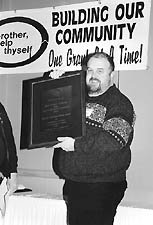 |
Held at the Washington Plaza Hotel, the event has become an annual watershed for several local organizations, many of which have come to depend on BHT’s unique grant-giving process to help fund their annual budget or supplement various programs. This year’s grants ranged from $225 for a direct donation to the Sexual Minority Youth Action League to $6,110 for the Dwayne S. Brown Foundation.
“This money will specifically fund our purchase of sheet music, ” says Jill Strachan of the Lesbian and Gay Chorus of Washington, which received $1,200. “It’s extremely important to us. “
Chip Wells, Executive Director of Pets-DC, says that the $4,200 awarded to his organization will go “to our client services programs, specifically for the purchase of veterinary care and pet food.”
First-time recipient Youth Pride Alliance was presented with $5,100 toward its annual Youth Pride Day event.
“This covers our basic cost for the day, ” says the group’s founder and Director of Development Chris Dyer. “Any money we get above this will now go toward getting better speakers and increased promotion of the event. “
BHT was founded in 1978 by members of the leather community concerned about the fate of a struggling Gay Men’s VD Clinic. The clinic (now the Whitman-Walker Clinic) received $3,162, while a second grant in the amount of $1,355 went to help fund the Gay and Lesbian Switchboard of Washington.
“When we started, ” says BHT Executive Director Larry Stansbury, “there were no funding mechanisms for these groups. We saw a need and filled it. “
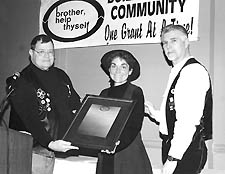 |
In the 25 years since, the all-volunteer BHT has presented over $1.6 million to local AIDS, healthcare, outreach and cultural organizations with monies raised from contributions, United Way/Combined Federal Campaign donations, and assorted regional fundraisers. This year’s grant dispersion totaled $76,371, down from last year’s record high of $106,239, but up from previous years, which had hovered around the upper $60,000 range.
“We tend to support the smaller groups and the upstarts — the folks who are struggling, ” says Mike Lentz, BHT’s treasurer for the past seven years. “We’re kind of like the everyman charity benefactor.
“We’ve given money to groups that were once small that later grew, ” he adds. “Once they became very large and had a full-time fundraising staff working for them or developed government-supported programs, they haven’t really had a need for us. “
In 2001, BHT came under fire from some of the city’s larger organizations when a $500,000 gross revenue cap was imposed on the grant applicants. The figure has since been increased to $1 million. And, says BHT President Tom Yates, additional modifications are underway.
“We’re talking about changing the million dollar income limit to a million dollar program limit, ” says Yates. “That way, a large organization with a large individual program in need of funding can participate in our grant process. “
But, he stresses, “When we give an organization that makes several million dollars annually, three thousand dollars — it’s bupkes to them, although I’m sure they appreciate it. But when we give an organization with a budget of ten thousand dollars that three thousand, it makes a real difference. “
According to Lentz, grantees must operate in the Washington-Baltimore area, must be a certified non-profit, and must have annual revenues of less than one million dollars. “They also need to have a focus on the lesbian and gay community, ” he says, “but it doesn’t have to be a one hundred percent focus. “
Hence, grants given to such non-gay-specific groups as HIPS, the D.C. Rape Crisis Center ($2,000), and Sign of Jonah Acupuncture ($3,630). BHT also helps to fund gay cultural organizations, including D.C.’s Different Drummers ($1,160), the Gay Men’s Chorus ($500) and One in Ten ($1,900). Says Stansbury: “We want these groups to focus on performing rather than having to go out and raise money constantly. “
BHT is unique in that is comprised of fourteen organizations — including D.C.’s most visible leather, cowboy, and drag clubs. All help to determine the grants and recipients.
In addition to grants, BHT annually presents special awards to individuals or groups within the gay community who have made a difference. This year’s recipients included The Mautner Project for Lesbians with Cancer, which received the Founders Award, and Sergeant Brett A. Parson of the D.C. Metropolitan Police force, who received the Anthony Bacharach Award for his efforts in helping to establish the Gay and Lesbian Liaison Unit.
“This award is really embarrassing, ” says Parson, “because I’ve never felt that the work I’ve done for the gay and lesbian liaison unit or for the community has been volunteer work. I’ve always considered it part of my job. “
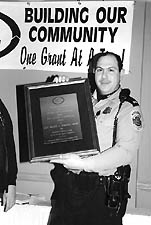 |
The Green Lantern/Tool Shed, which routinely holds fundraisers for the leather clubs, received this year’s George Dotson Business Award. “This award really belongs to the volunteers and clubs that do the work, ” says Green Lantern co-proprietor Greg Zehnacker. “I just supply the space and open the doors for the groups to come in. “
Last winter’s United Way/CFC donations — which fund roughly one third of BHT’s grant-dispersal operation — are expected to be down. How far down is unknown, since the numbers aren’t released until April.
Mike Lentz is concerned but largely unfazed. “We’ll just have to be energetic and creative to come up with new ways of raising money, ” he says.
Stansbury also seems unworried, noting that the community support for BHT is as strong as its support for the community.
“We have nurtured very strong relationships over the years, ” he says. “Other organizations that we support have come to know that if they get in a spot, all they need do is call us — we’ll do what we can. “
Perhaps Chris Dyer puts it best when summing up the impact of BHT.
“They’re invaluable, ” he says. “They’re the Gay United Way. “
Support Metro Weekly’s Journalism
These are challenging times for news organizations. And yet it’s crucial we stay active and provide vital resources and information to both our local readers and the world. So won’t you please take a moment and consider supporting Metro Weekly with a membership? For as little as $5 a month, you can help ensure Metro Weekly magazine and MetroWeekly.com remain free, viable resources as we provide the best, most diverse, culturally-resonant LGBTQ coverage in both the D.C. region and around the world. Memberships come with exclusive perks and discounts, your own personal digital delivery of each week’s magazine (and an archive), access to our Member's Lounge when it launches this fall, and exclusive members-only items like Metro Weekly Membership Mugs and Tote Bags! Check out all our membership levels here and please join us today!



















